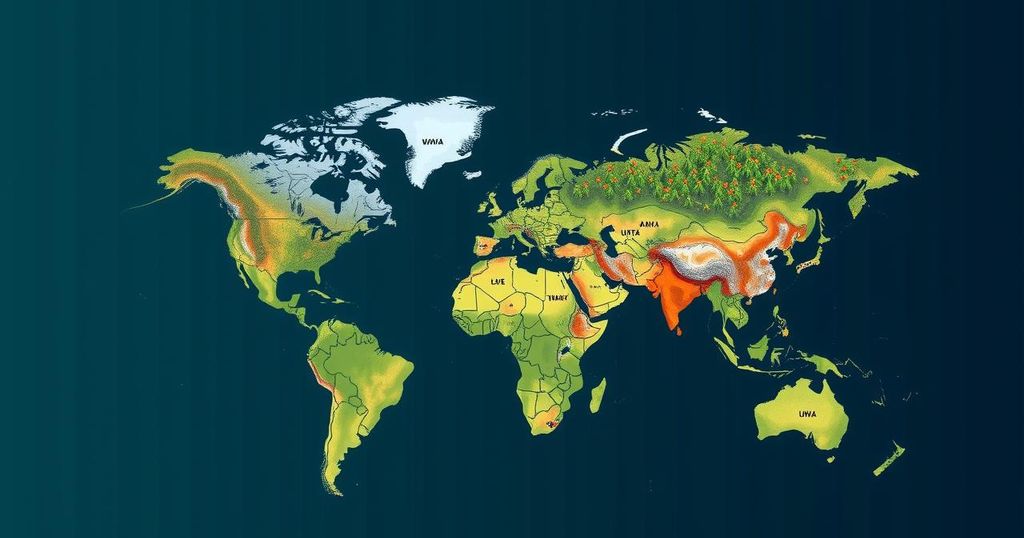The article analyzes the disturbing connection between climate change and the emergence of authoritarianism, highlighting how natural disasters create environments that encourage the rise of strongmen like Rodrigo Duterte. It discusses research findings that link climate crises to political instability, suggesting that fear and insecurity can lead to support for such leaders. The article also emphasizes the need for liberal democracies to adapt and promote collective action to counter authoritarian trends, ultimately underscoring that the political future is collectively shaped by society’s choices.
In November 2013, the Philippines experienced one of the most powerful tropical cyclones recorded, Super Typhoon Yolanda, which left devastation in its wake, officially claiming 6,300 lives, though the actual death toll was likely much higher. At the time, Rodrigo Duterte, the mayor of Davao City, garnered attention for his controversial response to the aftermath of the typhoon, including a troubling edict to security forces regarding looters. His reaction to the disaster, coupled with a politically charged campaign that criticized his opponent’s mishandling of recovery efforts, facilitated his election as president in 2016, despite subsequent years marked by significant human rights abuses, including a brutal anti-drug campaign and the imposition of martial law. The rise of Duterte signifies a broader trend, where natural disasters create fertile ground for authoritarian figures leveraging public discontent and fear to consolidate power. This phenomenon is not isolated to the Philippines; across the globe, leaders such as Prime Minister Narendra Modi in India, former President Jair Bolsonaro in Brazil, and former President Donald Trump in the United States have employed tactics that similarly exploit societal anxieties and foster suspicion towards marginalized groups. While these leaders did not ascend in the wake of an event as singular as Yolanda, their rise correlates with an observable increase in the frequency and severity of climate change-induced disasters. Scholarship indicates that the socio-political repercussions of climate change can promote authoritarianism. An individual’s desire for safety and reassurance during crises may lead to support for strong leaders promising decisive action. Research conducted by economists in the UK and Australia underscores this claim, showing that in the aftermath of severe storms, democracies often slide towards autocracy—a term the authors termed “storm autocracies,” noting an average decline of 4.25% in democracy scores for affected nations. In psychological research, exposure to information regarding the threats posed by climate change has been shown to induce negative sentiments towards marginalized communities, suggesting a potential increase in xenophobic and exclusionary attitudes during periods of environmental instability. Furthermore, although reactions to climate change information vary in their manifestation at the voting booth, they indicate significant psychological impacts that align with authoritarianism’s rise. Experts such as James McCarthy emphasize that accelerated climate change exacerbates feelings of societal insecurity and inequality. As communities confront the uncertainties brought on by climate crises, marginalized individuals often endorse the authority of strongmen tasked with restoring order and promise unwavering national interests. Even among those who deny climate change, there exists a recognition of its manifestations such as natural disasters, economic shifts, and rising costs of living—a fact that may influence political leanings. Despite the evident trends, there remains the potential for liberal democracies to respond effectively to the threats posed by climate change. Proposals including legislative reforms and taxation adjustments have been posited as measures to combat the appeal of populism and the erosion of democratic principles. In addition, environmental activism may provide a platform for collective action centered around shared ethics of social justice and environmental sustainability, diverting attention from divisive group identities. Ultimately, the future trajectory of governance in light of climate change is not predetermined. As McCarthy articulates, one must resist despair and recognize that collective will and concerted action remain essential to forging a democratic path forward amidst global adversities. “The future is not written,” he asserts, “It is what we make it.”
This article explores the intertwining relationship between climate change and the rise of authoritarian leaders globally, particularly focusing on how natural disasters create opportunities for such figures to consolidate power. The piece examines various case studies, including Rodrigo Duterte of the Philippines, and discusses the psychological impacts of climate crises that can foster authoritarian attitudes among populations. It aims to highlight the urgent need for liberal democracies to adapt in order to counteract these trends amid increasing environmental challenges.
The connection between climate change and the rise of authoritarianism underlines a profound societal challenge. Natural disasters often create conditions ripe for the emergence of strong leaders promising security and stability. This phenomenon is evident in multiple nations worldwide, as evidenced by leaders exploiting vulnerabilities within their communities. While the implications are concerning, the potential to strengthen democratic systems exists. By promoting collective actions prioritizing social justice and environmental protection, societies can resist the gravitational pull of authoritarianism and shape a more equitable future. Ultimately, the responsibility lies with individuals and governments to collectively determine the trajectory of their political landscapes amidst the impending challenges of climate change.
Original Source: www.fastcompany.com







